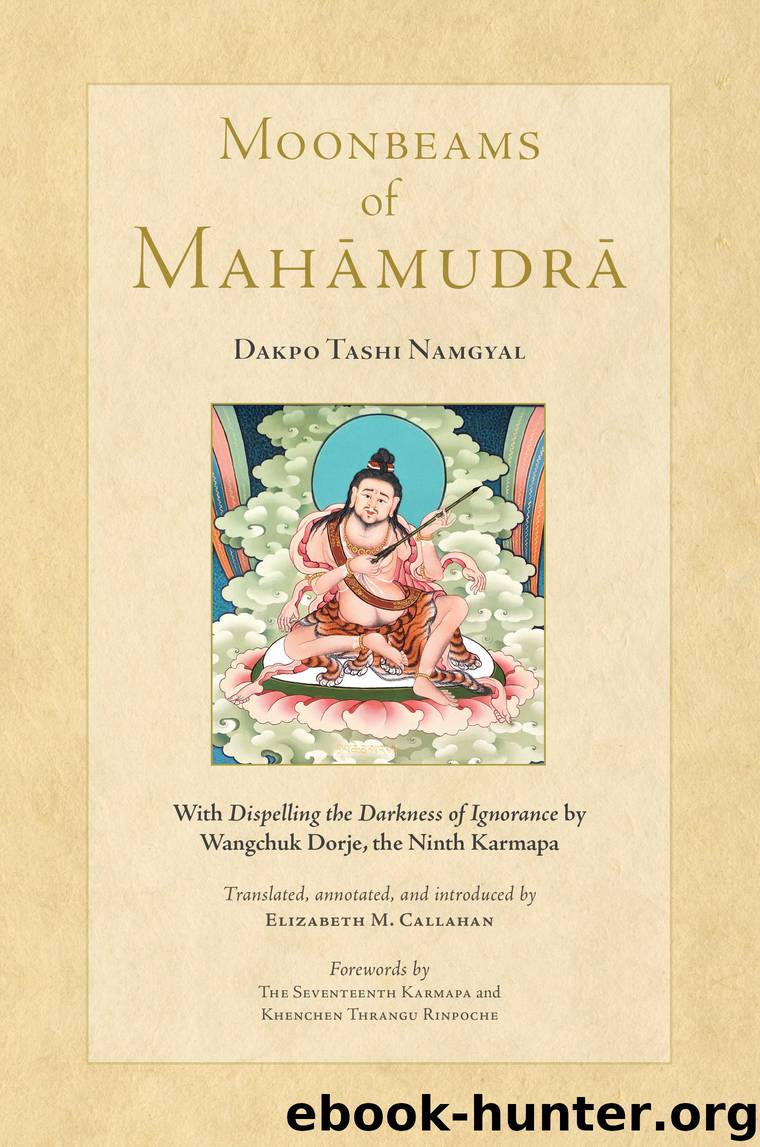Moonbeams of Mahamudra by Dakpo Tashi Namgyal & Elizabeth Callahan

Author:Dakpo Tashi Namgyal & Elizabeth Callahan
Language: eng
Format: epub
Publisher: Shambhala
Published: 2019-03-11T16:00:00+00:00
The mahāsiddha Zhang teaches:
When, on your own, you are proficient with the oral instructions, are unaffected by the hordes of external and internal māras, and can maintain pure ethical conduct without hypocrisy, then wander alone in mountain retreats.1337
The actual conduct has five modes:
1. Conduct like that of a wounded deer. Wounded deer don’t associate with others in their herd and withdraw their minds, remaining apart. Similarly, you should act alone, having given up close companions and withdrawing your mind from the concerns of this life—such as subjugating your enemies, caring for your friends, and keeping up good relations with your patrons.
2. Lionlike conduct. Lions are untroubled by other groups of animals, be they wild herbivores or carnivores. Similarly, do not be afraid of the obstacles presented by any situation, whether they be external ones created by humans or nonhumans, or internal ones, such as the movements of thoughts.
3. Conduct like the wind blowing through open space. Just as the wind blows through open space fluidly, transparently, and without being obstructed by objects, let your mind be transparent and open without any attachment or clinging to your body, possessions, pleasures, gain, or fame.
4. Spacelike conduct. Just as space is without support, you should not hold onto any reference point (such as thinking, “I will do this,” or “I am doing that”) and should not have any object of meditation, such as those with characteristics or those without characteristics. [453]
5. Conduct like that of a crazy person. In the same way that someone insane has no fixed reference points, you should have no fixations—no affirming or adopting something positive and no negating or rejecting what is unwholesome.
It is taught that those five modes of conduct are the means by which we can take whatever situations and appearances occur as the path and enhance our practice of the abiding state.
Download
This site does not store any files on its server. We only index and link to content provided by other sites. Please contact the content providers to delete copyright contents if any and email us, we'll remove relevant links or contents immediately.
The Way of Zen by Alan W. Watts(6601)
Ego Is the Enemy by Ryan Holiday(5415)
The Art of Happiness by The Dalai Lama(4125)
The Book of Joy by Dalai Lama(3976)
Why Buddhism is True by Robert Wright(3446)
Spark Joy by Marie Kondo(3299)
Shift into Freedom by Loch Kelly(3194)
Happiness by Matthieu Ricard(3040)
A Monk's Guide to a Clean House and Mind by Shoukei Matsumoto(2912)
The Lost Art of Good Conversation by Sakyong Mipham(2651)
The Meaning of the Library by unknow(2565)
The Unfettered Mind: Writings from a Zen Master to a Master Swordsman by Takuan Soho(2307)
The Third Eye by T. Lobsang Rampa(2260)
Anthology by T J(2207)
Red Shambhala by Andrei Znamenski(2193)
The Diamond Cutter by Geshe Michael Roach(2058)
Thoughts Without A Thinker: Psychotherapy from a Buddhist Perspective by Epstein Mark(2014)
Twilight of Idols and Anti-Christ by Friedrich Nietzsche(1892)
Advice Not Given by Mark Epstein(1878)
